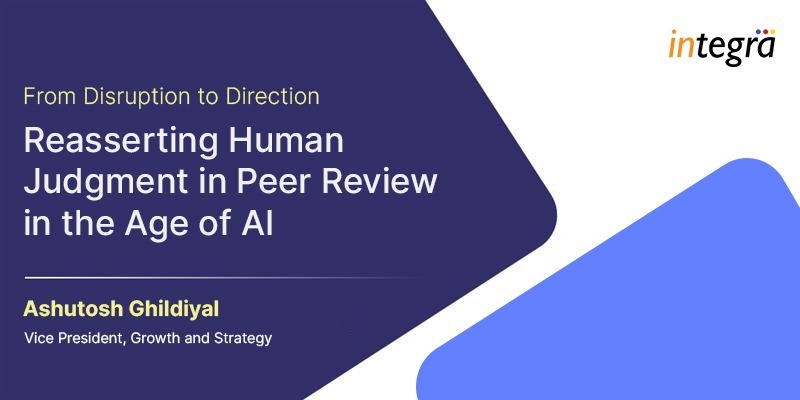The Future of Scholarly Publishing: Harnessing AI for Transformation

Introduction: The AI Imperative in Scholarly Publishing
The scholarly publishing landscape is undergoing a profound transformation as Artificial Intelligence (AI) becomes increasingly integrated into upstream workflows. AI’s revolutionary capabilities offer substantial benefits across critical areas of the publishing process, promising to reshape the industry’s future. This article examines the technological revolution led by AI, focusing on key upstream areas: manuscript triage, peer review, research integrity, and end-to-end workflow management.
The Need for Bold Innovation
The scholarly publishing industry stands at a critical juncture, facing mounting pressures to adapt to digital transformations, evolving author expectations, and intensified scrutiny of research integrity. To navigate this complex terrain, publishers must embrace innovative solutions that leverage cutting-edge technology. Fostering a culture of innovation is crucial for empowering stakeholders to overcome challenges and seize new opportunities in an increasingly competitive landscape.
Harnessing AI for Sustainable Growth in Scholarly Publishing
The scholarly publishing ecosystem grapples with several challenges that threaten its sustainability:
- An unprecedented surge in manuscript submissions.
- The emergence of AI-powered tools like ChatGPT, changing the nature of content creation.
- Rising reviewer burnout due to increasing workloads.
- Persistent threats to research integrity.
AI tools provide innovative solutions to these issues, improving efficiency, quality, and integrity while alleviating stress and burnout among stakeholders. By embracing AI, publishers can create a more sustainable and resilient publishing ecosystem.
Key Areas of AI Integration
- Manuscript Triage: Enhancing Decision-Making
Advanced Machine Learning Algorithms:
Machine learning algorithms analyze historical data to predict the likelihood of acceptance for submissions, streamlining workflows and guiding authors to the most suitable journals.
How AI Works in Manuscript Triage:
AI systems use natural language processing (NLP) techniques to analyze the structure, content, and style of submissions. These tools assess sentence complexity, coherence between sections, and predict acceptance likelihood based on features like topic relevance, methodological robustness, and novelty.
Addressing the Surge in Submissions:
AI tools manage the increased volume of manuscripts by:
- Automated Screening: Evaluating writing clarity, structure, and journal guidelines adherence.
- Topic Classification: Routing manuscripts to relevant editors.
- Plagiarism Detection: Identifying potential text recycling or unoriginal content.
- Peer Review: Streamlining the Process
AI-augmented services enhance peer review by reducing cycle times and maintaining standards. Key AI techniques include:
- Reviewer Selection: Algorithms match manuscripts with appropriate reviewers based on expertise and availability.
- Semantic Analysis: Ensures a strong match between reviewer expertise and manuscript content.
- NLP: Extracts key information from reviewer comments to summarize feedback.
- Machine Learning for Reviewer Performance: Predicts reviewer quality and timeliness.
- Automated Summarization: Provides concise summaries of peer reviews.
- AI-Based Translation & Fact-Checking: Improves accessibility and ensures accuracy in manuscripts.
- Reviewer Matching Optimization: Balances workload distribution to prevent reviewer burnout.
- Research Integrity: Upholding Ethical Standards
AI tools safeguard academic credibility by detecting plagiarism, data fabrication, and ensuring ethical standards.
AI Methods for Ensuring Research Integrity:
- Text Similarity Detection: Identifies potential plagiarism.
- Image Analysis: Detects manipulated or duplicated images.
- Statistical Anomaly Detection: Flags unusual data patterns.
- Citation Network Analysis: Identifies citation manipulation.
Ethical Considerations in AI-Powered Publishing
- Bias in AI Systems:
To mitigate bias:
- Use diverse training data representing various fields and demographics.
- Conduct regular AI audits.
- Involve diverse teams in AI system development.
- Transparency and Explainability:
- Clearly communicate how AI is used in the evaluation process.
- Make AI systems explainable for critical decisions.
- Ensure human oversight with mechanisms for appeals.
- Data Privacy and Security:
- Implement strong data protection and transparency measures.
- Ensure compliance with GDPR, CCPA, and other regulations.
- Impact on Academic Labor:
- Highlight how AI can augment human capabilities rather than replace them.
- Invest in reskilling programs to adapt to new workflows and technologies.
Embracing AI for Academic and Publishing Excellence
AI presents transformative opportunities across the publishing ecosystem. By responsibly adopting these technologies, stakeholders can enhance researcher support, streamline workflows, and uphold high academic standards. Thoughtful integration of AI will contribute to the sustainable growth and evolution of scholarly publishing, ensuring efficiency, transparency, and ethical integrity.
Empowering Editorial Professionals
Editorial professionals remain at the heart of scholarly publishing, and AI is designed to empower them—not replace them. AI tools automate routine tasks, providing data-driven insights that allow professionals to focus on high-value activities requiring human expertise, judgment, and creativity. This collaboration between human and AI capabilities will elevate the quality of published research and accelerate scientific discovery.
The Road Ahead: Collaborative Innovation
The future of scholarly publishing lies in collaborative innovation. By embracing AI as a tool to augment human capabilities, technologists, publishers, researchers, and ethicists can shape systems that meet the needs of the scholarly community while upholding the highest standards of academic integrity.
Together, we can create a publishing ecosystem that is more efficient, inclusive, and equipped to tackle the complex challenges of our time. With responsible AI integration, scholarly publishing will continue to play a vital role in advancing human knowledge.
Take the Next Step
Ready to revolutionize your publishing process? Explore how AI can transform your workflows, enhance the quality of your publications, and drive sustainable growth in scholarly publishing. Contact us today to learn more about our AI-powered solutions and how they can be tailored to meet your needs.
At Integra, we celebrate the contributions of editorial professionals, recognizing their invaluable service to the scholarly community. Our advanced tools empower them, ensuring they continue to play a crucial role in advancing human knowledge through research. As a trusted partner, we offer human-led, technology-assisted solutions tailored for editorial, research integrity, and peer review management.
About the Author:
Ashutosh Ghildiyal is the Vice President of Growth and Strategy at Integra, a leading global provider of publishing services and technology. With over 18 years of experience in scholarly publishing, he is dedicated to driving sustainable growth and shaping the future of the industry through innovative AI-driven solutions.
Recent Blogs

Print, Pedagogy, and AI: The New Architecture of Educational Publishing

From Disruption to Direction: Reasserting Human Judgment in Peer Review in the Age of AI


